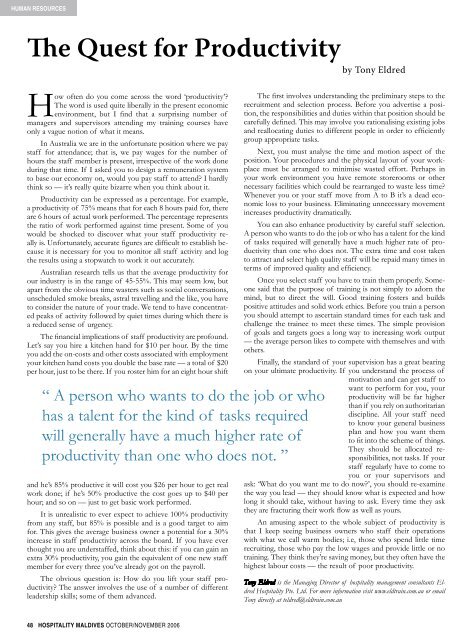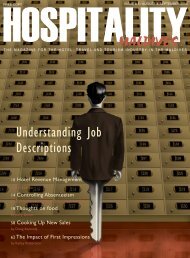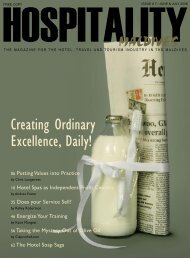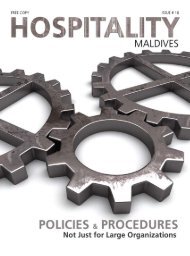Don't Let Your Systems Drive Your Customers Crazy! - Hospitality ...
Don't Let Your Systems Drive Your Customers Crazy! - Hospitality ...
Don't Let Your Systems Drive Your Customers Crazy! - Hospitality ...
Create successful ePaper yourself
Turn your PDF publications into a flip-book with our unique Google optimized e-Paper software.
HUMAN RESOURCES<br />
The Quest for Productivity<br />
by Tony Eldred<br />
How often do you come across the word ‘productivity’?<br />
The word is used quite liberally in the present economic<br />
environment, but I find that a surprising number of<br />
managers and supervisors attending my training courses have<br />
only a vague notion of what it means.<br />
In Australia we are in the unfortunate position where we pay<br />
staff for attendance; that is, we pay wages for the number of<br />
hours the staff member is present, irrespective of the work done<br />
during that time. If I asked you to design a remuneration system<br />
to base our economy on, would you pay staff to attend? I hardly<br />
think so — it’s really quite bizarre when you think about it.<br />
Productivity can be expressed as a percentage. For example,<br />
a productivity of 75% means that for each 8 hours paid for, there<br />
are 6 hours of actual work performed. The percentage represents<br />
the ratio of work performed against time present. Some of you<br />
would be shocked to discover what your staff productivity really<br />
is. Unfortunately, accurate figures are difficult to establish because<br />
it is necessary for you to monitor all staff activity and log<br />
the results using a stopwatch to work it out accurately.<br />
Australian research tells us that the average productivity for<br />
our industry is in the range of 45-55%. This may seem low, but<br />
apart from the obvious time wasters such as social conversations,<br />
unscheduled smoke breaks, astral travelling and the like, you have<br />
to consider the nature of your trade. We tend to have concentrated<br />
peaks of activity followed by quiet times during which there is<br />
a reduced sense of urgency.<br />
The financial implications of staff productivity are profound.<br />
<strong>Let</strong>’s say you hire a kitchen hand for $10 per hour. By the time<br />
you add the on-costs and other costs associated with employment<br />
your kitchen hand costs you double the base rate — a total of $20<br />
per hour, just to be there. If you roster him for an eight hour shift<br />
“ A person who wants to do the job or who<br />
has a talent for the kind of tasks required<br />
will generally have a much higher rate of<br />
productivity than one who does not. ”<br />
and he’s 85% productive it will cost you $26 per hour to get real<br />
work done; if he’s 50% productive the cost goes up to $40 per<br />
hour; and so on — just to get basic work performed.<br />
It is unrealistic to ever expect to achieve 100% productivity<br />
from any staff, but 85% is possible and is a good target to aim<br />
for. This gives the average business owner a potential for a 30%<br />
increase in staff productivity across the board. If you have ever<br />
thought you are understaffed, think about this: if you can gain an<br />
extra 30% productivity, you gain the equivalent of one new staff<br />
member for every three you’ve already got on the payroll.<br />
The obvious question is: How do you lift your staff productivity?<br />
The answer involves the use of a number of different<br />
leadership skills; some of them advanced.<br />
The first involves understanding the preliminary steps to the<br />
recruitment and selection process. Before you advertise a position,<br />
the responsibilities and duties within that position should be<br />
carefully defined. This may involve you rationalising existing jobs<br />
and reallocating duties to different people in order to efficiently<br />
group appropriate tasks.<br />
Next, you must analyse the time and motion aspect of the<br />
position. <strong>Your</strong> procedures and the physical layout of your workplace<br />
must be arranged to minimise wasted effort. Perhaps in<br />
your work environment you have remote storerooms or other<br />
necessary facilities which could be rearranged to waste less time?<br />
Whenever you or your staff move from A to B it’s a dead economic<br />
loss to your business. Eliminating unnecessary movement<br />
increases productivity dramatically.<br />
You can also enhance productivity by careful staff selection.<br />
A person who wants to do the job or who has a talent for the kind<br />
of tasks required will generally have a much higher rate of productivity<br />
than one who does not. The extra time and cost taken<br />
to attract and select high quality staff will be repaid many times in<br />
terms of improved quality and efficiency.<br />
Once you select staff you have to train them properly. Someone<br />
said that the purpose of training is not simply to adorn the<br />
mind, but to direct the will. Good training fosters and builds<br />
positive attitudes and solid work ethics. Before you train a person<br />
you should attempt to ascertain standard times for each task and<br />
challenge the trainee to meet these times. The simple provision<br />
of goals and targets goes a long way to increasing work output<br />
— the average person likes to compete with themselves and with<br />
others.<br />
Finally, the standard of your supervision has a great bearing<br />
on your ultimate productivity. If you understand the process of<br />
motivation and can get staff to<br />
want to perform for you, your<br />
productivity will be far higher<br />
than if you rely on authoritarian<br />
discipline. All your staff need<br />
to know your general business<br />
plan and how you want them<br />
to fit into the scheme of things.<br />
They should be allocated responsibilities,<br />
not tasks. If your<br />
staff regularly have to come to<br />
you or your supervisors and<br />
ask: ‘What do you want me to do now?’, you should re-examine<br />
the way you lead — they should know what is expected and how<br />
long it should take, without having to ask. Every time they ask<br />
they are fracturing their work flow as well as yours.<br />
An amusing aspect to the whole subject of productivity is<br />
that I keep seeing business owners who staff their operations<br />
with what we call warm bodies; i.e, those who spend little time<br />
recruiting, those who pay the low wages and provide little or no<br />
training. They think they’re saving money, but they often have the<br />
highest labour costs — the result of poor productivity.<br />
Tony Eldred is the Managing Director of hospitality management consultants Eldred<br />
<strong>Hospitality</strong> Pte. Ltd. For more information visit www.eldtrain.com.au or email<br />
Tony directly at teldred@eldtrain.com.au<br />
48 HOSPITALITY MALDIVES OCTOBER/NOVEMBER 2006

















